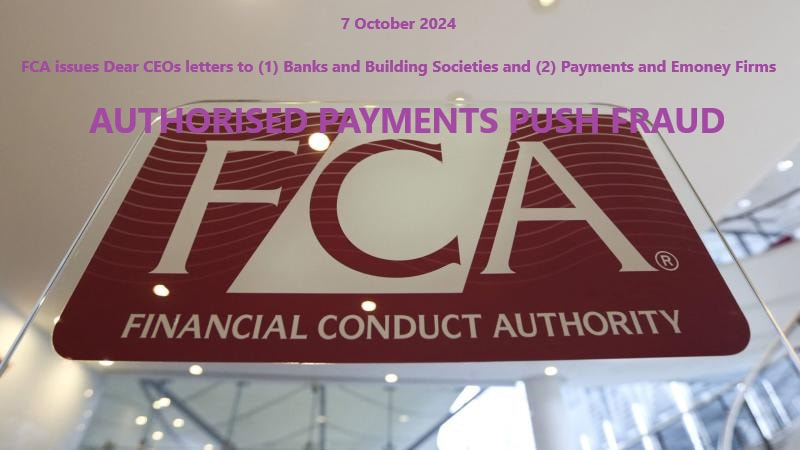FCA Letter to Banks and Building Societies (7 October 2024) (from Emad Aladhal, Director, Retail Banking Supervision, Policy & Competition).
Started as a Linkedin Post by Peter Oakes, Founder of Fintech UK. https://www.linkedin.com/feed/update/urn:li:activity:7249312812194230272/
The letter outlines the FCA's expectations regarding Authorised Push Payment (APP) fraud reimbursement and highlights several key points:
- Financial Crime Prioritization: The FCA emphasizes its commitment to reducing financial crime, particularly APP fraud, which significantly harms society and consumer confidence.
- New Reimbursement Measures: Effective October 7, 2024, the PSR requires Payment Service Providers (PSPs) using the Faster Payments System (FPS) and CHAPS to reimburse victims of APP fraud, unless the victim was grossly negligent.
- Cost Sharing: The costs of reimbursements will be shared equally between sending and receiving firms to encourage better fraud detection and prevention.
- Payment Delays Legislation: PSPs can delay processing payments for up to four business days if fraud is suspected, allowing for a risk-based approach to payment processing.
- Anti-Fraud Systems: PSPs must enhance their anti-fraud systems and controls, ensuring effective governance, ongoing monitoring, and customer due diligence to prevent fraud.
- Consumer Duty: Firms must avoid causing foreseeable harm to consumers and must provide adequate support throughout the customer lifecycle, particularly in complaint handling.
- Information Obligations: PSPs must inform customers about dispute resolution options, including access to the Financial Ombudsman Service.
- ‘On Us’ Payments: The reimbursement policies apply only to external payments (FPS and CHAPS), and firms must ensure that customers understand any differences in protection levels for intra-firm payments.
- Regulatory Monitoring: The FCA and PSR will monitor compliance with reimbursement requirements and data from PSPs to ensure effective consumer protection.
- Communication Protocol: PSPs are reminded to notify regulators of significant changes promptly and can contact the FCA or PSR as needed for inquiries.
Overall, the letter underscores the regulatory framework aimed at enhancing consumer protection against APP fraud and the responsibilities of PSPs in this context.
The letter outlines the FCA's expectations for Payment Service Providers (PSPs) regarding Authorised Push Payment (APP) fraud reimbursement. Key points include:
- Financial Crime Priority: The FCA highlights the significant societal harm caused by financial crime, including fraud, and emphasizes its commitment to reducing such activities.
- Reimbursement Requirements: Starting October 7, 2024, PSPs using the Faster Payments System (FPS) and CHAPS must reimburse victims of APP fraud, unless the victim was involved in the fraud or acted with gross negligence.
- Cost Sharing: The reimbursement costs will be shared equally between sending and receiving firms to encourage proactive fraud prevention.
- Payment Delays: New regulations allow PSPs to delay payment processing by up to four business days if fraud is suspected, enabling a more thorough assessment of potentially fraudulent transactions.
- Anti-Fraud Systems: PSPs must enhance their fraud detection systems, ensure effective governance, conduct regular reviews, and maintain strong customer due diligence measures.
- Capital Management: Firms are urged to manage potential liabilities from fraud reimbursements, adjusting their business models accordingly.
- Consumer Duty: Under the Consumer Duty, firms must prevent foreseeable harm to customers and must provide adequate support throughout the customer lifecycle, especially regarding complaints.
- Information Obligations: PSPs are required to inform customers about alternative dispute resolution options, including access to the Financial Ombudsman Service.
- ‘On Us’ Payments: Reimbursement policies apply only to external payments (FPS and CHAPS), and firms must clarify any differences in protection levels for intra-firm payments.
- Regulatory Monitoring: The FCA and PSR will monitor compliance with reimbursement policies and gather data to ensure effective consumer protection.
- Communication Protocol: PSPs must notify regulators promptly of significant changes and can contact the FCA or PSR for assistance.
The letter issued to Payments and Emoney Firms includes:
"Capital and liquidity PSPs should recognise and manage their potential liability and the impact this may have on their capital and liquidity. We expect PSPs to review and adjust their business models and transactions to mitigate against any risk of prudential impact that may result from potential APP fraud reimbursement liabilities."
The UK FCA seems far less concerned about the introduction of the new APP Fraud regime on banks/building societies than it is for payments and emoney firms.

